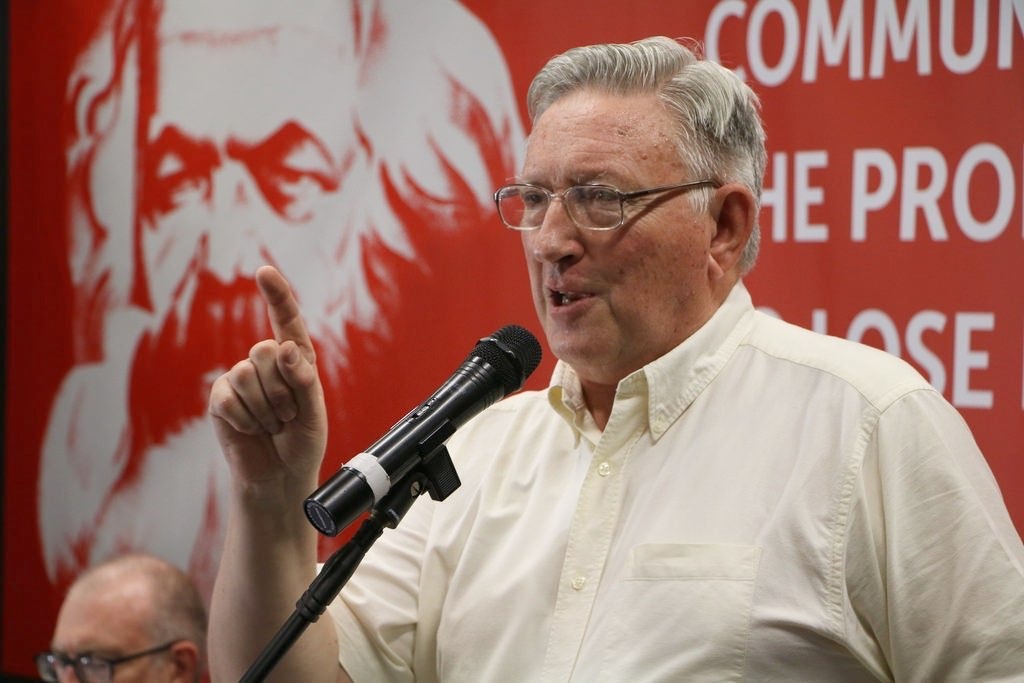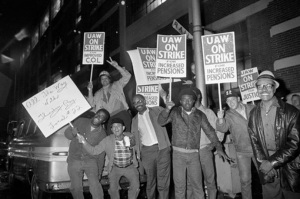This month, the International Marxist Tendency, led by Alan Woods, is rebranding some of its biggest sections. It plans to found a Revolutionary Communist Party in Great Britain, another in Switzerland, and yet another in Canada. As this article was going to press, they just announced they are renaming themselves the Revolutionary Communist International. For the last year, IMT members have been distributing the same sticker in several countries. “Are you a communist? Then get organized.” A QR code allows you to sign up for the IMT and start sending them money.
The IMT has existed in its current form for 30 years, and it has seldom used hammers and sickles until recently. What’s behind the rebranding? Let’s look at the IMT’s history to understand its current trajectory.
Split from the CWI
The IMT was founded in 1992 (although it adopted the name IMT only a decade later) as a split from the Committee for a Workers International. The CWI was the Trotskyist group founded in 1974 by Ted Grant, centered around the Militant tendency inside the British Labour Party.
Grant was a leader of the Fourth International, the revolutionary organization founded by Leon Trotsky, when it collapsed into centrism in the postwar period. After 1945, when the Trotskyist movement was isolated and disoriented, several leaders thought their best hope was to hibernate inside social democratic parties, turning the short-term tactic of “entryism” into a long-term strategy. While originally doubtful of this “entryism sui generis” (which can also be called “long-term entryism” or “entryism without exitism”), Grant soon became its most committed adherent.1For a slightly more detailed version of this history, see my article on the split of the CWI in 2019. For a longer analysis of the Fourth International’s political collapse in the early 1950s, see “At the Limits of Bourgeois Restoration.”
When a youth radicalization began around 1968, most splinters of the Trotskyist movement broke free of social democracy and founded new, independent revolutionary organizations. Grant, however, doubled down on his orientation to the Labour Party: he declared it a “historical law” that, in times of upheaval, the masses will always turn to their “traditional mass organizations,” obligating Marxists to join reformist parties.
Decades of work inside the Labour Party was naturally incompatible with defending an openly Bolshevik program. Under Grant’s leadership, Militant defended a centrist program that attempted to split the difference between revolutionary and reformist positions — raising only those demands that would not “scare off” an “average” worker. Militant, for example, claimed that socialism could be implemented peacefully if the Labour Party won a majority in parliament and carried out a bold socialist program. It claimed that police are “workers in uniform” and should be organized in trade unions. When Margaret Thatcher’s government launched an imperialist war against Argentina, Grant rejected any kind of anti-imperialist resistance because that would “put Marxists beyond the pale in the eyes of workers.”
You might also be interested in: Forty Years since Thatcher’s War against Argentina — Lessons for Today
By the mid-1980s, Militant had reached a certain influence (though claims of 8,000 members are exaggerated). Eventually, the Labour Party bureaucracy decided to rid itself of the Trotskyists running Labour’s youth organization. Militant, committed to a perpetual orientation to Labour, could not fight back — instead, Grant’s supporters attempted to burrow deeper. This led to demoralization and a collapse in membership numbers. By the early 1990s, much of the group’s sprawling apparatus under Peter Taaffe (with over 250 full-time staffers!) decided it needed to break with Labour to save what remained of the organization. This “Scottish turn” is when the majority of the CWI, after many decades, left social democracy.
What later became known as the IMT was the CWI minority, led by Grant and Woods, who opposed this break. Grant said leaving Labour would mean throwing away decades of patient work. Thus, the IMT’s whole reason for existence was to hold out inside the Labour Party, the German SPD, and other reformist workers’ parties.
The CWI and later the IMT practiced their long-term entryism not only in bourgeois workers’ parties but also in purely bourgeois parties, such as the Party of the Democratic Revolution (PRD) and later MORENA in Mexico, or the Pakistan People’s Party of the hyper-corrupt Bhutto clan. The IMT has elected only a single member to a national parliament — he was elected as a PPP candidate who, by the IMT’s own account, was just as corrupt as his party.
Searching for Subjects
After splitting from the CWI, the IMT continued as “the Marxist voice of social democracy” for several more decades. Yet it faced the same objective problem as Taaffe’s supporters: as Labour, the SPD, and similar parties implemented brutal neoliberal policies, they attracted fewer and fewer socialist-minded workers and young people. So the IMT, while formally committed to its entryist principles, had to cast out for new milieus.
It found a topic that enthused left-leaning youth in the early and mid-2000s: the pink tide governments in Latin America. Woods became a cheerleader for Venezuelan president Hugo Chávez. After the coup attempt in 2002 was defeated by mass mobilizations, Chávez changed his rhetoric and proclaimed his goal to be “socialism of the 21st century.”
As we’ve explained at length elsewhere, Chávez’s government represented what Marxists call Bonapartism sui generis. Hoping to gain more autonomy from imperialism, a section of the bourgeoisie of a semicolonial country needs to mobilize the masses with progressive demands. This is how Trotsky analyzed the government of Lázaro Cárdenas in Mexico in the 1930s, for example. Woods refused to apply Marxist categories to Venezuela — he declared that Chávez was leading a socialist revolution, even though Chávez was the head of a bourgeois state and always defended private property of the means of production. Chávez never even stopped paying the country’s foreign debt to imperialism. Woods applied Grant’s theoretical justification for opportunism, writing that a clear Marxist analysis of the Venezuelan government would be “sectarian” and “would immediately cut us off … from the masses.”
You might be interested in: Was There a Socialist Revolution in Venezuela? Using Trotsky’s Ideas to Understand Chávez’s Legacy
Woods’s strategy was based on the idea that the Bolivarian government, with enough pressure from the masses, could be pushed to break from capitalism. This is a classically centrist strategy, formulated in the early 1950s by Michel Pablo as a justification for his political support for the Algerian government of Ben Bela.
It is noteworthy that the IMT broke, without any comment, with Grant’s tradition. In the 1960s, Grant had criticized Pablo and other Trotskyist leaders for their adaptation to the Cuban deformed workers’ state under Fidel Castro and Che Guevara. Grant insisted that a proletarian revolution was necessary in Cuba, one that would establish a leadership independent of the Stalinists. Yet Woods was now arguing that socialism could be achieved in Venezuela under the leadership of Chávez, the head of a bourgeois state. This echoed Militant’s old, anti-Marxist belief in the possibility of a peaceful transition to socialism.
And this is not just a break with Grant’s legacy — it is, above all, a break with everything Trotsky wrote about Latin America during his Mexican exile. While Trotsky called on workers to reject “People’s Front parties,” the IMT campaigned for workers to join Chávez’s party, the PSUV, and thus to unite with a progressive wing of the bourgeoisie.
As Chávez’s left Bonapartist project decayed under his successor Nicolás Maduro, adopting increasingly authoritarian and neoliberal policies, the IMT finally broke with the PSUV. Yet this was no break with the bourgeois-nationalist ideology of Chavismo. The IMT formed an alliance with the Stalinist party demanding a return to the Chavismo of Chávez.2For a critique of the Revolutionary Popular Alliance (APR) in Venezuela, formed by Stalinists, social democrats, and the IMT, see our sister site in Venezuela, Ángel Arias, “Sobre la APR y los ataques del Gobierno/PSUV: Se necesita un balance histórico y lecciones estratégicas.” Ideas de Izquierda Venezuela. September 27, 2020. Left Voice’s sister organization in Venezuela, the Workers League for Socialism (LTS), has fought for the political independence of the working class.
You might also be interested in: Socialists Should Not Support AMLO
This opportunism was not limited to Venezuela. Woods similarly declared his support for the bourgeois government of Evo Morales in Bolivia. And for several decades, the IMT in Mexico has supported Andrés Manuel López Obrador (AMLO), who was first mayor of the capital and is now president of the country. In the United States, the IMT correctly argues that socialists can never support Bernie Sanders because he is a bourgeois politician. South of the Río Grande, however, the IMT is unfamiliar with the principle of class independence. By embellishing Chavismo and other bourgeois governments, the IMT makes it more difficult to explain to young people what communism is and what it is not.
Creeping to the Left
Over the 2010s, while the IMT held up Grantian orthodoxy in theory, it was creeping to the left and silently breaking with its entryist strategy. In the UK, it ceased working as part of Young Labour, and instead set up its own Marxist student groups. When the Socialist Workers Party entered into crisis in 2013, losing its hegemonic spot as the largest radical left group at British universities, the IMT partially filled the void.
New layers of young people politicized during or after the capitalist crisis of 2008 are far more to identify with communism. Radicalization, facilitated by social media, has put broad swaths of young people quite a bit to the left of the IMT’s traditional positions. The IMT, for example, had always defended cop unions, claiming that these will draw police into the workers’ movement and “undermine the ability of the capitalist state to repress the working class.” Yet the millions who took to the streets in the Black Lives Matter movement in 2020 understood that cop unions are completely reactionary institutions that need to be expelled from our the labor movement.
Aiming to adapt to this new consciousness without renouncing its old position, the IMT has now ended up with hopelessly muddled formulations on police. It says it takes “the approach of opposing the actions of police unions that are at the expense of the wider working class, but supporting those actions that benefit workers and bring rank-and-file police closer to the labour movement.” In a typically centrist fudge, this sentence can mean either full support for cop unions or complete rejection. As Left Voice and the Trotskyist Fraction, we had no need to revise our positions in 2020, as we have always explained that cops are not workers. The IMT, in contrast, says that cop unions in the U.S. are irredeemably reactionary but potentially progressive in Canada or the rest of the world.
Even greater contradictions have come to the fore regarding Palestine. As we detailed in another article, for decades the IMT defended a “socialist two-state solution,” arguing that a “socialist Israel” should exist next to a “socialist Palestine.” In our opinion, the IMT’s position represents a concession to chauvinism. Growing numbers of young people support the Marxist proposal for a single, democratic, socialist Palestine as part of a Socialist Federation of the Middle East. So the IMT has silently changed its position and has been scrubbing its website of some of the most odious anti-Palestinian content from the mid-2000s (with links available here).
You might also be interested in: The Farce of the “Two-State Solution” and the Socialist Perspective for Palestine
On several questions, the IMT is moving to the left and closer to correct Trotskyist positions. At the very least, it is quieter about its support for cop unions or a “socialist Israel.” Yet nowhere is it acknowledging these shifts, much less explaining them.
Lack of Theory
This brings us to the “revolutionary communist” rebranding. In just a few weeks, the IMT will break with some 70 years of work inside reformist parties. When Taaffe led the majority of the CWI out of social democratic parties 30 years ago, he aimed for theoretical consistency. Taaffe still defended Grant’s “historical law” that Marxists needed to be inside the “traditional mass organizations” of the working class. He posited, however, that Labour and other reformist parties had ceased to be bourgeois workers parties and were now simple bourgeois parties. This theory failed to account for the fact that in many countries, reformist parties continued to base themselves on the union bureaucracy, and therefore indirectly on the working class. (This, in our opinion, never obliged Marxists to adapt to such parties and work within them for decades.) At the very least, it was an attempt to provide a theory for a major strategic shift.
Now, Woods and his IMT are taking the same turn that Taaffe and the CWI did three decades ago — yet Woods, who considers himself something of a theoretician, has provided not a word of justification for this, besides generalities about communism. If it was a sectarian adventure to leave the Labour Party and found a competing party in the 1990s, as well as just 15 years ago, so why is that the right policy in the 2020s? Is the Labour Party under Starmer that much different from what it was under Blair?
It is welcome that the IMT has set itself the goal of building revolutionary communist parties. Yet this cannot be done by propaganda groups without well-known leaders of working-class struggles making proclamations. And despite calling himself a “revolutionary communist,” it does not appear that Woods has ceased supporting Mexico’s bourgeois government.
You might also be interested in: The Split in the CWI: Lessons for Trotskyists
Without any kind of serious programmatic base, the IMT’s leftward shift cannot last — it will turn back to the right with the next fad. One wild zig is inevitably followed by an equally wild zag. The IMT comrades are breaking with their long-held strategy of adaptation to reformism, but this is an organizational rather than a political break. This is clear when looking at the CWI’s record since leaving Labour: although it was no longer part of a reformist party, it continued to believe that some kind of reformist party is a necessary halfway house on the way to a revolutionary formation. This led the CWI to support “new” reformist parties in different parts of the world.
You might also be interested in: Trans Liberation and Socialist Revolution — A Debate with the IMT
Real Class Independence
In many ways, the IMT has unceremoniously dumped many of the positions that made up Grant’s tradition. In one sense, though, Woods is proving to be Grant’s most loyal student: both were masters of self-aggrandizement. The IMT often claims that Militant was the largest Trotskyist organization in the world after 1945. This is patently false. Even at its height, Militant could not compare to the LCR in France, the MAS in Argentina, not to mention the Trotskyists in Vietnam or Bolivia.
Woods proclaims that the IMT is “the only organisation that has a responsibility for re-establishing communism.” Other organizations, simply by not being the IMT, are all “sects.” It seems that IMT leaders, while moving somewhat closer to other Trotskyist tendencies politically, are increasing their vitriol. Woods says that any proposals for collaboration between different socialists should go “straight in the waste paper basket.”
For a counterexample, let’s look at the largest Trotskyist organizations in the world today. Trotskyists in Argentina form the Workers Left Front — Unity (FIT-U), of which the largest component is the Party of Socialist Workers (PTS), the sister group of Left Voice. The FIT-U has five seats in Argentina’s congress (four of whom belong to PTS members), having won over 700,000 votes. The Trotskyist Left can mobilize some 25,000 people in Buenos Aires, filling soccer stadiums. More importantly, Trotskyist workers are in hundreds of workplaces and have led many important struggles.
With a tiny handful of members in Argentina, the IMT has made vague criticisms of the FIT, accusing the front of a “parliamentary bias.” Yet the PTS comrades have a proud record of using the parliamentary tribune for revolutionary agitation. As we have seen, the IMT has never had an opportunity to show in practice how their representatives would act in a bourgeois parliament.
Just a decade ago, Woods was calling for Marxists in Argentina to join the progressive bourgeois coalition of Néstor and Cristina Kirchner. This is completely in line with his support for Chávez, Morales, AMLO, and other pink tide governments. Fortunately, most Trotskyists in Argentina rejected Woods’s wisdom and instead founded a coalition based on class independence. They have shown that they can work together on the basis of a class-struggle program while openly debating their differences.
It is a shame that Woods was willing to form a front with Chávez, Morales, or any number of other bourgeois governments, while rejecting any collaboration between socialists. We believe that especially in the context of Israel’s genocidal assault on Gaza, it is imperative for socialists to work together as closely as possible, while making no secret of their differences. If Woods rejects this idea, we are convinced that IMT members are willing to consider it.
As Left Voice, we have a manifesto for a working-class party for socialism that we are proposing as a possibility to bring together organized socialists, militant workers, and young people in the United States. The PTS and the FIT-U in Argentina represent the largest and most successful Trotskyist project in the world right now. But it would be absurd to proclaim them to be the only revolutionaries. Instead, the experiences of the FIT can serve as a basis to build up genuine parties and rebuild the Fourth International. This can result only from both struggle and collaboration between the different tendencies of the revolutionary socialist movement.
Notes
| ↑1 | For a slightly more detailed version of this history, see my article on the split of the CWI in 2019. For a longer analysis of the Fourth International’s political collapse in the early 1950s, see “At the Limits of Bourgeois Restoration.” |
|---|---|
| ↑2 | For a critique of the Revolutionary Popular Alliance (APR) in Venezuela, formed by Stalinists, social democrats, and the IMT, see our sister site in Venezuela, Ángel Arias, “Sobre la APR y los ataques del Gobierno/PSUV: Se necesita un balance histórico y lecciones estratégicas.” Ideas de Izquierda Venezuela. September 27, 2020. |











